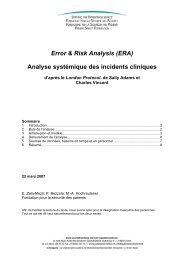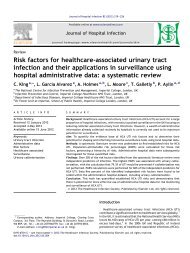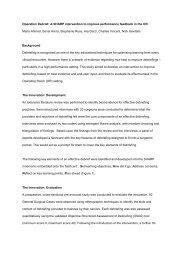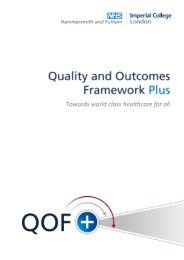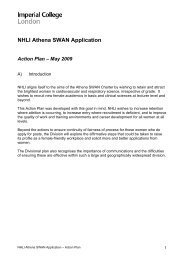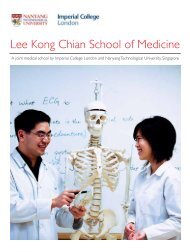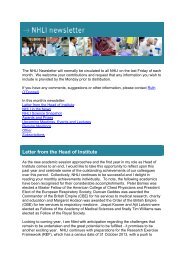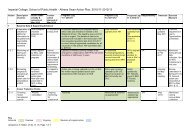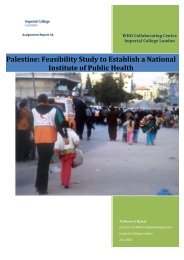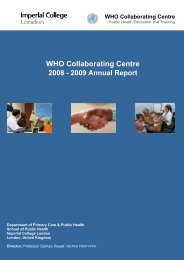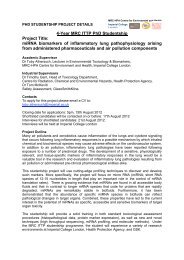MRes Translational Medicine Academic year 2012/2013 Division of ...
MRes Translational Medicine Academic year 2012/2013 Division of ...
MRes Translational Medicine Academic year 2012/2013 Division of ...
Create successful ePaper yourself
Turn your PDF publications into a flip-book with our unique Google optimized e-Paper software.
<strong>MRes</strong> in Clinical Research (Pathway in <strong>Translational</strong> <strong>Medicine</strong>) - <strong>Academic</strong> Year <strong>2012</strong>-<strong>2013</strong>Part A – Overview / IntroductionIntroductionWelcome to the <strong>MRes</strong> Clinical Research programme (TM pathway) at Imperial CollegeLondon.The course comprises four pathways (<strong>MRes</strong> <strong>Translational</strong> <strong>Medicine</strong>, <strong>MRes</strong> Clinical Research Designand Management, <strong>MRes</strong> Cellular Pathology and <strong>MRes</strong> Human Nutrition).The <strong>MRes</strong> in <strong>Translational</strong> <strong>Medicine</strong> pathway has been designed for post-graduate students withMBBS or BSc degrees. It combines an introduction to the theory behind and technologies currentlyused in drug discovery, pharmacokinetics, role <strong>of</strong> biomarkers and surrogate endpoints, preclinicalsafety assessment, first-time-in-human studies, clinical investigation paradigms, researchgovernance and medical statistics.This programme capitalises on the excellence in experimental medicine and clinical research atImperial College London and Imperial College Healthcare NHS Trust. Imperial College London isranked in the top 4 internationally for Biomedicine and its associated clinical campuses are widelyrecognised as centres <strong>of</strong> excellence for clinical research.Teachers from academia and industry and an excellent basic and clinical research infrastructureprovide an appropriate environment for advanced, hands-on training in the theoretical and practicalaspects <strong>of</strong> clinical research. This course intends to develop highly skilled and motivated academicclinical scientists for the future.Investigators with diverse backgrounds, from systems biology to specific disease areas –inflammation, cardiovascular, respiratory, metabolic medicine, oncology, neuro-psychiatric diseases– will provide guidance on a variety <strong>of</strong> topics embraced by <strong>Translational</strong> <strong>Medicine</strong>, includingcomponents <strong>of</strong> the critical pathway for drug development, the design and conduct <strong>of</strong> early phasestudies in humans, ethics and research governance, through interactive, plenary sessions,discussions and networking opportunities.Programme aims:To provide students with the theoretical aspects <strong>of</strong> supporting and managing clinicalresearch. To this end, the lecture programme will cover major aspects <strong>of</strong> clinical trialregulation and governance, study design and implementation, clinical skills across sometherapeutic areas, and research dissemination skills.To enable students to put the underpinning theory into practice by contributing to clinicalresearch, taking responsibility for a project and producing a project report.To give students the opportunity to obtain an understanding <strong>of</strong> research methodologies bystudying in a World-leading clinical research environment.To equip students to pursue clinical academic careers, or to undertake employment either asClinical Trial Coordinators or in Research and Development.Familiarise students with the challenges facing research in healthcare and translatingevidence into practice.4



